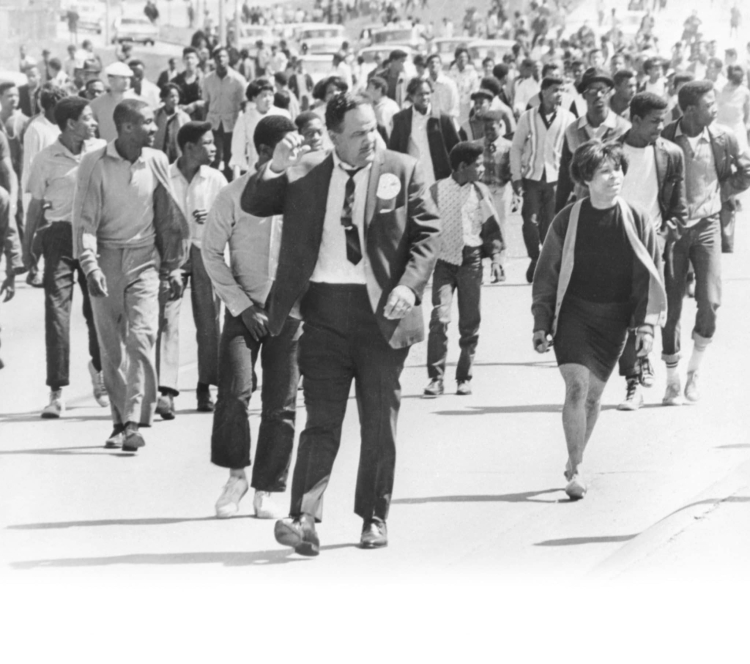Central Library has a new parking validation process.

When people think of civil rights advocacy, they might consider towering figures in the Civil Rights Movement, such as Rosa Parks or Martin Luther King Jr.
"But beyond that framework," says Digital History Specialist Jason Roe, "the term ‘civil rights’ encompasses opportunities and equal protection under the law for all persons, regardless of their demographics, socioeconomic backgrounds, beliefs, gender, or disabilities."
Thanks to a $4 million, three-year grant from the Andrew W. Mellon Foundation, says Roe, there's "a unique opportunity to better understand the many advocates who advanced civil rights for the people of Kansas City in the mid- to late-twentieth century."
The Library is one of more than a dozen partners in the new grant-funded Kansas City Monuments Coalition led by the UMKC Center for Digital and Public Humanities, to preserve historic sites and offer public programming in the region with the community’s help.
One of the first forays into outreach is a request for proposals that’s open to scholars, researchers, public historians, artists, creative writers, as well as activists and their descendants. The accepted pitches will result in featured content on a new Library digital history site and inclusion in a symposium in November 2026.
A team will start reviewing submissions on July 31.
This marks a "crucial step toward building a team of scholars who will collaborate, review one another’s work, and ultimately share their findings with the public through a book, a website, and speaking engagements," says Roe.
Dr. Sandra I. Enríquez, associate professor of history and director of public history emphasis at UMKC, is a social historian of modern U.S. history and cowrote the grant proposal to create the Kansas City Monuments Coalition.
"This is an opportunity to focus on a region that has not received that much scholarly attention," Enríquez says, "particularly when it comes to civil rights movements writ large."
The new digital history site in development is called "An Era of Rights: Kansas City’s Struggle for Equality." The focus, says the Library's digital branch manager David LaCrone, will be on a "restive period from the 1950s to the 1990s ... of political activism and community uplift."
Library staff and others will develop this multimedia resource over the next few years, incorporating original research, photographs, correspondence, audio and video recordings, and more.
The project provides a chance, says Roe, "to uncover, preserve, and share important aspects of Kansas City’s civil rights history that have flown under the radar for decades."
Enríquez adds, "It is also really exciting to be able to connect to folks who are just as interested and committed to telling the stories of diverse Kansas Citians and their struggle to fight for equality in our city and in our region, to work with community members and document these stories."
Some of the other initiatives under the umbrella of the Monuments Coalition include restoring the 1885 Banneker School in Parkville, Missouri, installing public art in the historic Steptoe neighborhood, and creating a monument to honor Indigenous women in Kansas City, Kansas.
Each project reflects the Mellon Foundation’s multi-year goal of "transforming the nation’s commemorative landscape to ensure our collective histories are more completely and accurately represented."
Dr. Bridget Haney, historian, State Historical Society of Missouri, wrote her dissertation on Kansas City history from the 1880s to the 1940s, and extended the time frame into the 1980s in her post-doctoral work. The Monuments Coalition projects, Haney says, will play a crucial role in protecting – and uncovering – some of the overlooked stories.
"I understand the importance of really solidifying this history," she says. "It's definitely a project that Kansas City desperately needed to make sure we don't lose this local history."
The Library’s efforts are modeled on previous collaborations, which produced books and public programming on Bleeding Kansas, Bleeding Missouri: The Long Civil War on the Border, Wide-Open Town: Kansas City in the Pendergast Era, and the websites Civil War on the Western Border: The Missouri Conflict, 1854-1865 and The Pendergast Years: Kansas City in the Jazz Age and Great Depression.
Roe says he’s looking forward to the potential for discoveries, whether that’s connecting to scholars or starting "conversations that lead us to hidden archival collections or to people who participated directly in these movements."